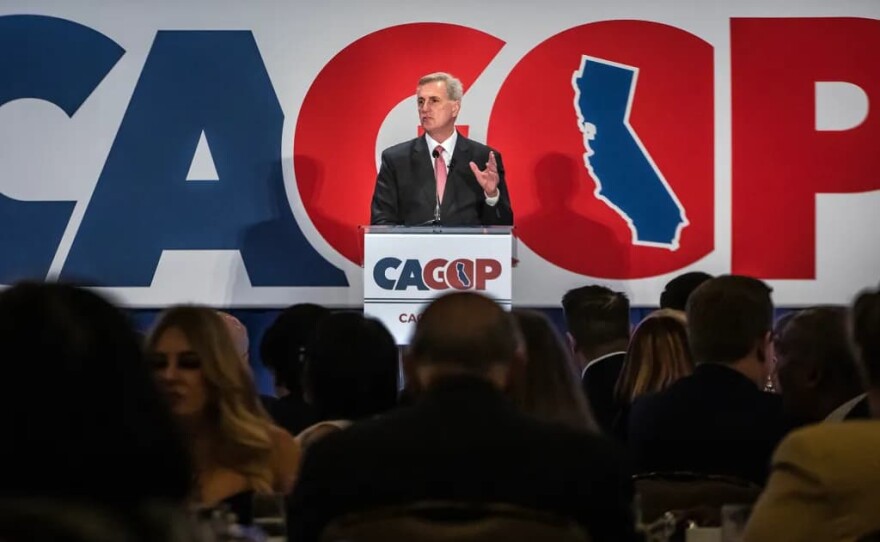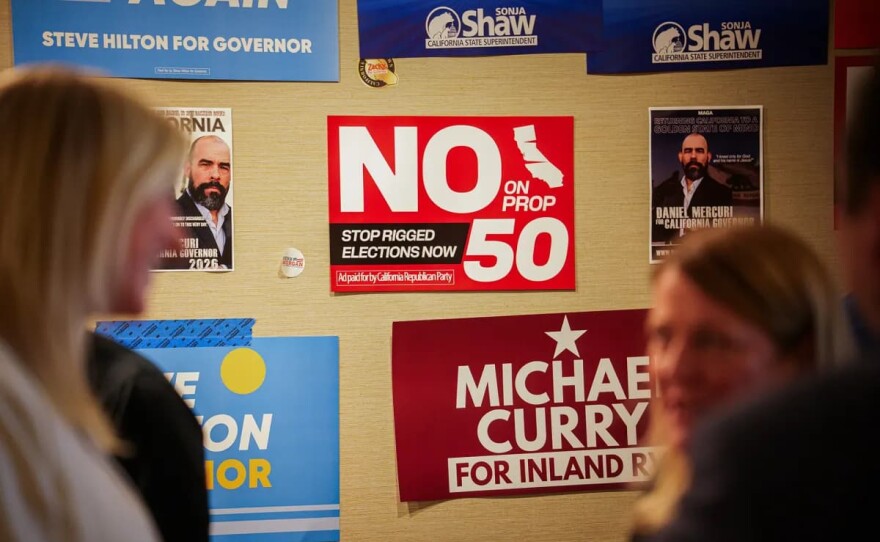This story was originally published by CalMatters. Sign up for their newsletters.
First, they lost their speaker. Then, they lost a key special election.
Now, with the passage of Proposition 50, California Republicans are poised to lose five congressional seats in next year’s midterms — and with them, any remaining shred of national influence they once held.
The party was already floundering after the ouster and resignation of former House Speaker Kevin McCarthy, a prolific fundraiser who could channel campaign resources to his fellow California Republicans and run interference with the Trump administration and other GOP leadership when they needed to take tough votes.
Absent McCarthy’s arm-twisting in D.C. and with a powerless superminority in both chambers of the state Legislature, California Republicans appear headed for an era of obsolescence, at least for the next five years.
Proposition 50’s landslide win owes its success in part to the abject failure of a disarrayed No on 50 campaign low on funds and unable to keep up with the Yes side’s deluge of savvy advertising.
McCarthy reportedly told his former Republican congressional colleagues that he would help raise up to $100 million to defeat the measure. But that money never materialized. Instead, his No on 50: Stop the Sacramento Power Grab committee only pulled in $11.6 million, with $1 million of that from McCarthy’s defunct congressional campaign account.
While the House Republicans’ super PAC pitched in $5 million to the Stop the Power Grab committee and $8 million to the state Republican Party, no financial help came from President Donald Trump or the White House donor circle, and the president only engaged at the last minute to call the election “rigged” and discourage Republicans from trusting mail-in voting.
Rob Stutzman, a California Republican political strategist, said he didn’t know what happened to the promised $100 million, but his best guess is the decision came from Trump and the White House to not open the fundraising floodgates. After all, a Republican from Texas, Missouri or North Carolina is just as valuable to building a House majority as a Republican from California — and far less expensive to elect.
“Doug LaMalfa and Kevin Kiley and Ken Calvert go to bed at night knowing that Donald Trump just doesn’t care about them and is more than happy to trade them in for a Texan,” Stutzman said. “I don’t think that would’ve happened if McCarthy was still speaker.”
“I think Kevin would’ve fought for his members,” Stutzman added. “They were loyal to him, he was loyal to them, and there would’ve been a fully funded campaign out here.”
A spokesperson for McCarthy declined to make him available for an interview in time for publication.
New leadership at the helm of California GOP
The disappointing Republican turnout against Prop. 50 and the opposition campaign’s meek closing performance only displayed publicly what party insiders and operatives have been grumbling about behind the scenes for months, ever since the party gained new leadership this spring.
Corrin Rankin, a former Democrat who voted for Barack Obama in 2008 and “agonized” for weeks before admitting she was a Republican, ascended to chair of the California Republican Party in March after winning a tense election against former state Sen. Mike Morrell. She previously served as vice chair under the outgoing chair, Jessica Millan Patterson, who was widely respected as a McCarthy protegé and a prolific fundraiser and strategist.
During a historic three-term stint as the party’s first Latina chair, Millan Patterson won praise after turning the party around from its last rock-bottom moment following the 2018 midterm elections. Under her tenure, the party also flipped three legislative seats in 2024 and increased Trump’s vote share in nearly every county.
But as Rankin was taking over, she reportedly declined her predecessor’s offer to retain a transition team of advisers to help her new staff.
“It’s taken a step backward from Jessica’s leadership and how strong her leadership was because of McCarthy’s perch of power,” Stutzman said of the party.

Rankin and her spokesperson, Matt Shupe, declined multiple interview requests.
In an emailed statement in response to CalMatters' questions, Shupe wrote: “Change can be uncomfortable for some people, but we have been reimagining and rebuilding our organization to register new Republicans and win using the latest technology and tactics."
“We have initiated an after-action review to measure what worked and what we will improve to ensure our highly adaptable, innovative organization, led by Chairwoman Rankin is ready to defeat Democrats in 2026 and beyond," he wrote.
In the months since her election, multiple public rifts appear to have shown the lack of faith in Rankin’s ability to successfully steer the party’s fundraising and messaging efforts.
In July, the Legislature’s then-top Republicans, Assemblymember James Gallagher and Sen. Brian Jones, suddenly announced a change in the decades-old practice of splitting campaign donations between the party and legislative leadership’s re-election committees, known as the “one-ask” policy. That gave the party great legal leeway to distribute campaign donations where they were needed most.
“By and large, no one cares about political parties. They care about elected Republican leaders,” former Sen. Jim Brulte, a former party chair who oversaw the implementation of the one-ask policy in 2001. He said party leaders need to foster close relationships with state and congressional lawmakers and major donors. Before he sought the chairmanship, he locked up that support, he said.
“From everything I’ve read, those relationships have withered a little bit,” Brulte said. “They’re not raising as much money as they probably need to. They probably have to repair the relationships that have not been nurtured.”
Some have privately suggested that the elimination of the arrangement amounted to a rebuke of Rankin’s leadership and a boiling over of legislators’ frustrations that the party was not funneling as much money back to statehouse races.
Gallagher declined to comment through his spokesman. A spokesman for Jones said he was unavailable to answer questions in time for publication.
“I think she’s gotten some really bad advice, and we’re seeing it play out in real time. And it’s not been fun,” Brulte said. “I’m disappointed to say that the party has done a good job of making itself irrelevant.”
A divided campaign against Prop. 50
A day after Gov. Gavin Newsom and Democrats in the Legislature engineered a statewide special election to vote on new gerrymandered congressional districts that favor Democrats, opposition mailers started hitting voters’ mailboxes. One was paid for by Republican billionaire and good governance champion Charles Munger Jr., who would go on to sink $33 million of his own money into the fight against Prop. 50.
The other pamphlet, which warned recipients to “stop the political power grab,” was paid for by “Right Path California,” a new group backed by McCarthy and headed by Millan Patterson, flanked by her former leadership team from her days as party chair.
For the next 10 weeks, it was Millan Patterson and Right Path California, not Rankin and the California Republican Party, that spearheaded the Republican anti-Prop. 50 messaging as Munger and his team worked to energize independents and disaffected Democrats. The party was relegated to getting out the vote, a process that critics say that it botched by wasting money on mailers sent to voters who had already turned in their ballots weeks before.
“I just don't think there's respect for the money donated to the party by the people that are spending the money,” said Cathy Abernathy, a Bakersfield-based Republican strategist. She said she was disappointed that opponents of Prop. 50 didn’t appeal directly to Republicans by putting Trump and other elected leaders’ faces on materials, so she worked with the Kern County party to send out her own.
“The mail I designed was Shannon Grove, Congressman Vince Fong, Kevin McCarthy, and Donald Trump right on the cover,” she said. “Every piece of mail I got paid for by some statewide group with ties to the Republican Party, or the Republican Party, the smallest word on the mailer, the smallest word was ‘paid for the Republican Party.’ There was no word ‘Republican’ other than that.”
'We left it all on the field.'California Republican Party chair Corrin Rankin on the party's 'No' campaign against Proposition 50.
When asked at a press conference to respond to critics of her leadership, Rankin stood firm and said she was “very proud” of the party’s work opposing Prop. 50.
“We left it all on the field,” Rankin said. “Everyone worked incredibly hard. I'm proud of our staff. I'm proud of our central committees, and I think we did an incredible job. We worked as a team, and we are 100% united.”
As of Oct. 31, the party still had $2.85 million left in its state and federal accounts, according to an internal presentation given to the board of directors and obtained by CalMatters.
There’s no denying that the double-whammy of losing McCarthy and now several powerful incumbent GOP seats will diminish the party’s clout in Washington, putting even more pressure on the state party to fend for itself.
“Matt Gaetz destroyed the California Republican Party infrastructure that we had,” said Stutzman, the Republican adviser, using an expletive to describe the former Florida congressman who engineered McCarthy’s ouster. “McCarthy would’ve made sure there was a No campaign that resonated because it would’ve been funded.”
This article was originally published on CalMatters and was republished under the Creative Commons Attribution-NonCommercial-NoDerivatives license.






